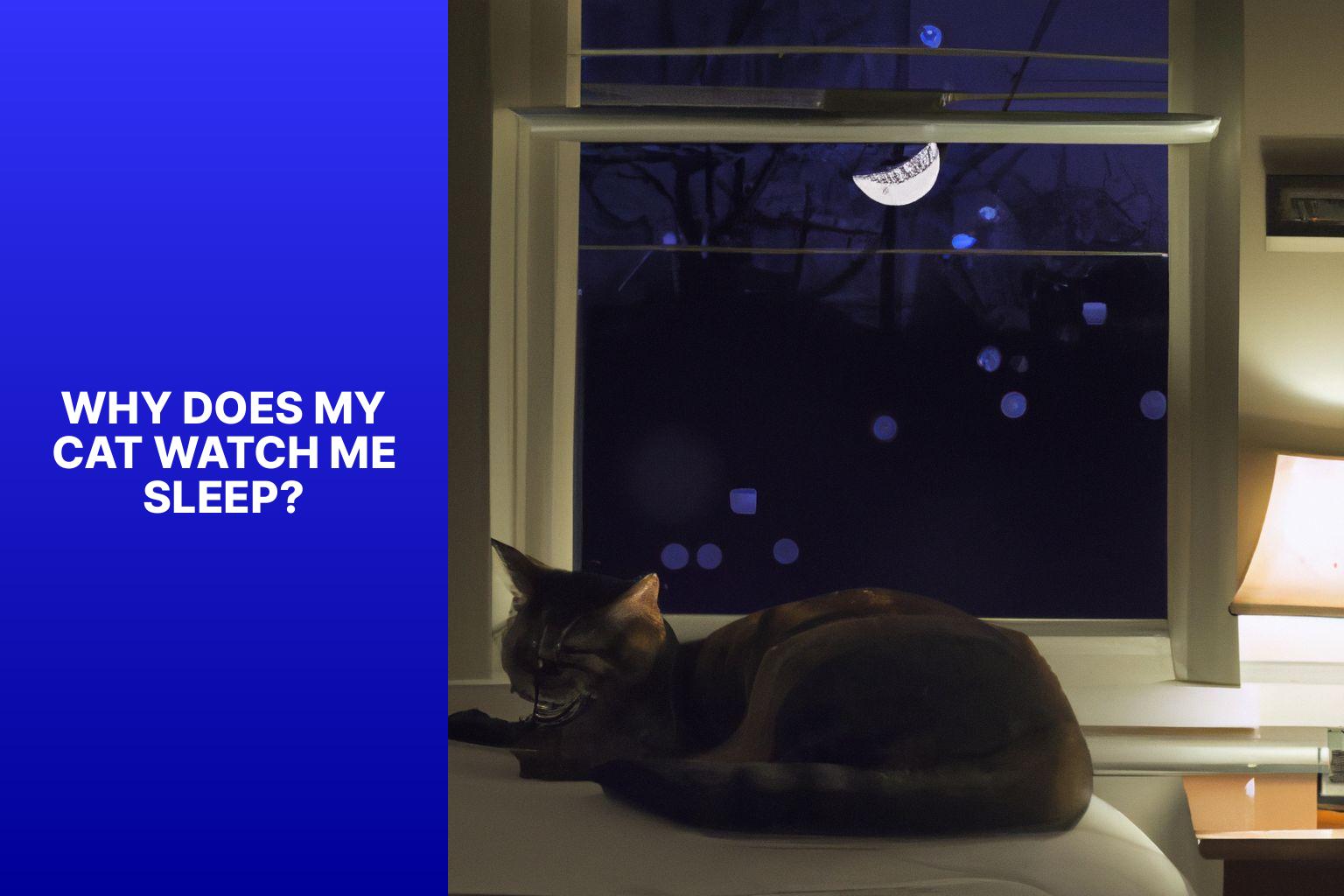Why Does My Cat Watch Me Sleep? This is a common question that cat owners often ponder. Cats have mysterious and intriguing behaviors, and watching their human sleep is no exception. There are several reasons why your feline friend may engage in this behavior, as suggested by veterinarians and feline behavior experts.
1. Natural Curiosity: Cats are naturally inquisitive creatures, and they may simply be interested in observing your sleeping habits and behaviors. They are keen observers of their surroundings, and watching you sleep is intriguing for them.
2. Bonding and Attachment: Cats are known to form strong bonds with their owners. By watching you sleep, your cat may feel a greater sense of closeness and connection with you, reinforcing the bond between you.
3. Protection and Security: Cats are territorial and instinctively protective. By watching over you during sleep, your cat may be acting as a guardian, ensuring your safety and providing a sense of security.
4. Mimicking Behavior: Cats are masters at imitation. If they see you spending a lot of time in bed, they may assume it’s a desirable place to be and choose to join you, even if it’s just for observation.
5. Seeking Attention: Cats are known for their desire for attention. By watching you sleep, they may be seeking interaction or trying to communicate their needs to you.
Understanding what it means when your cat watches you sleep can offer insights into your feline companion’s behavior and emotions. It often signifies trust, comfort, and affection. If your cat’s behavior becomes excessive or interferes with your sleep, it may be a cause for concern and require further attention.
To respond to your cat watching you sleep, it’s essential to respect their space and boundaries. Providing a safe and comfortable sleeping environment, establishing a bedtime routine, and ensuring their basic needs are met can help create a sense of security for your cat.
In some cases, watching your sleep may indicate potential health concerns in your cat. If you notice other changes in their behavior or persistent disturbances during your sleep, it is advisable to consult with a veterinarian to rule out any underlying medical issues.
By understanding and responding appropriately to your cat’s behavior, you can foster a harmonious relationship and ensure both you and your feline friend have restful nights.
Key takeaway:
- Natural curiosity: Cats watching humans sleep is driven by their innate curiosity to understand their surroundings and observe their owners’ behavior.
- Bonding and attachment: Your cat may watch you sleep as a way to strengthen the bond and feel closer to you, showing their affection and attachment.
- Protection and security: Cats may also watch over their owners while they sleep to fulfill their instinctual role as protectors and provide a sense of security.
Why Does My Cat Watch Me Sleep?
Photo Credits: Www.Catcornerblog.Com by Alexander Hill
Ever wondered why your cat stares at you while you sleep? In this intriguing section, we’ll uncover the reasons behind this peculiar behavior. From their natural curiosity to their need for bonding and attachment, there are several intriguing explanations that shed light on your cat’s watchful gaze. We’ll also explore how their protective instincts, mirroring behavior, and craving for attention play a role in their nocturnal surveillance. Get ready to dive into the fascinating world of feline behavior as we uncover the mystery of why your cat keeps an eye on you while you slumber.
Natural Curiosity
Cats watch humans sleep out of their natural curiosity. They are naturally curious creatures and are intrigued by their human companions’ behaviors. When a cat watches its owner sleep, it is simply trying to understand what is happening.
Cats are highly aware and always observant of their surroundings. Watching their owners sleep allows them to satisfy their natural curiosity and learn about their human’s sleep patterns and behaviors. They may also be interested in the sounds, smells, or movements that occur during sleep.
This curiosity can be seen as a sign of a close bond between the cat and its owner. It shows that the cat feels comfortable and secure in their presence and wants to be a part of their daily routines, even during sleep.
It’s important to respect the cat’s natural curiosity and not be alarmed by their behavior. Cats may be seeking attention or security. As long as they are not causing harm or disturbances during sleep, there is no need for concern.
Bonding and Attachment
Bonding and attachment are essential factors in comprehending why cats observe their humans sleep. Cats establish strong bonds with their human companions, and observing their humans sleep aids in strengthening this connection. Cats experience a feeling of comfort and security when they are in close proximity to their preferred person, even while asleep. They exhibit this behavior through head butts, purring, and snuggling.
When a cat watches you sleep, it signifies affection and love. They feel a deep bond with you and desire to be near you, even when you are unconscious. This behavior is a way for them to express their loyalty and profound attachment to you.
Another reason why cats watch their humans sleep is to act as a loyal guard. Cats have an innate instinct to protect their loved ones, and by attentively keeping an eye on you while you sleep, they fulfill their role as a protective companion.
Cats also observe their humans sleep to unwind and share a moment of tranquility with their favorite person. It presents them with an opportunity to relax and enjoy a quiet time together.
Pro Tip: If your cat’s watching behavior becomes excessive or disrupts your sleep, it may indicate an underlying issue. Consider providing them with comfort items, such as a cozy bed or a warm blanket, to encourage them to sleep comfortably on their own.
Protection and Security
Protection and security are paramount reasons why cats observe their owners while they sleep. With their instincts for protection and security, cats stay vigilant to defend and safeguard those they consider their own. By maintaining a watchful eye throughout their owners’ sleep, cats deepen their bond and establish trust. To cats, their home and their owners are their territory, and they are always alert to potential threats. This heightened sense of awareness allows them to quickly react to any dangers or disturbances that may arise, ensuring the protection and security of their owners.
A touching anecdote that exemplifies the protection and security cats offer revolves around an extraordinary feline named Whiskers. Whiskers faithfully slept at the foot of his owner’s bed every night. During one incident, Whiskers sensed the presence of an intruder in the household and immediately alerted his owner, acting as a guardian in the dark. Thanks to Whiskers’ unwavering vigilance, the owner promptly contacted the authorities, preventing any harm from befalling them. This remarkable account emphasizes the innate protective nature of cats and their dedication to guaranteeing the security of their owners, even in moments of rest.
Mimicking Behavior
Mimicking behavior is a common occurrence among cats and serves various purposes. Cats often mimic human behavior as a means of establishing and strengthening social bonds. They imitate actions like sleeping or grooming to convey their desire for closeness and a sense of belonging. Mimicking behavior also aids cats in learning and effectively communicating with humans. By observing and imitating your actions, they can gain an understanding of how things are done. Cats may engage in mimicking behavior to seek attention. If they observe that imitating your actions elicits a response, such as being petted or played with, they will continue to mimic your behavior in order to receive the desired attention. Mimicking your behavior during sleep or meal times helps cats establish a routine and feel secure in their environment. Cats are naturally curious creatures, and mimicking your behavior allows them to observe and learn from you. Actions such as stretching or grooming assist them in comprehending and adapting to their surroundings. By understanding why your cat engages in mimicking behavior, you can strengthen your bond and enhance your relationship with your feline companion.
Seeking Attention
When your cat watches you sleep, they may be seeking attention. Cats are curious animals who enjoy observing their human companions. They watch you sleep in hopes of interacting with you and getting your attention. This is especially common in cats that have a close bond with their owners.
Cats may stare at you and try to wake you up to engage with you. They may rub against you or give you gentle head butts to get your attention. Some cats may even meow or paw at you to wake up and interact with them.
An example of this behavior is Oliver, a cat who would sit on his owner’s chest every morning and stare at his face until he woke up. Oliver would then “talk” to his owner and demand to be fed. This behavior was Oliver’s way of seeking attention and making sure his needs were met.
If your cat is watching you sleep and seeking attention, it’s important to respond to their needs. Take a moment to interact with your cat and give them attention. This helps strengthen the bond between you and ensures that your cat feels loved and cared for.
Remember, every cat is different, and their motivations may vary. By paying attention to your cat’s behavior and understanding their individual needs, you can develop a strong and loving relationship with your feline friend.
What Does It Mean When Your Cat Watches You Sleep?
Ever wondered why your furry feline friend stares at you while you sleep? In this section, we’ll uncover the fascinating meanings behind your cat’s late-night gaze. From trust and comfort to affection and bonding, we’ll explore the different emotions and connections your cat may be experiencing. We’ll also touch on the element of cautious observation and potential health concerns that might be driving your cat’s curious behavior. So, get ready to dive into the intricate world of your cat’s watchful eyes at bedtime.
Trust and Comfort
Cats watching their owners sleep is a clear manifestation of trust and comfort. When a cat gazes at you while you slumber, it signifies that they feel safe and have developed a strong bond with you. This behavior is particularly prevalent in cats that share a close relationship with their owners.
Despite being independent creatures, when cats choose to actively observe you while they nap or sleep, it is a genuine display of their complete trust in you. They feel secure and protected in your presence, which is why they elect to be near you.
To reinforce the trust and comfort between you and your cat, it is essential to provide them with a secure sleeping environment. Offering cozy items such as a warm bed or blanket will contribute to their sense of security. Respecting their personal space and refraining from disturbing them while they sleep is also crucial.
In addition, trust and comfort can be enhanced by engaging in activities that promote bonding, such as playtime and gentle petting. Fulfilling their basic needs, including keeping their food bowl consistently filled, is another way to help them feel secure.
Always bear in mind that when cats watch you sleep, it signifies the deep bond and trust they have established with you. Cherish this special connection and honor their desire for relaxation and privacy.
Affection and Bonding
Affection and bonding are crucial elements when a cat observes you sleep. Let’s explore why your cat displays affection and forms bonds with you:
- Trust and Comfort: When your cat watches you sleep, it demonstrates trust and a feeling of security in your presence. This behavior deepens your bond.
- Close Bonding: Cats develop strong bonds with their owners. Observing you sleep is their way of expressing love and loyalty.
- Affectionate Gestures: Cats often exhibit affection through head butts, slow blinks, and facial rubbing. When your cat watches you sleep, it is their means of conveying affection.
- Security and Protection: Cats possess a natural instinct to safeguard their loved ones. By observing you sleep, your cat acts as a faithful guardian, ensuring your well-being.
- Sharing Moments: Cats are social creatures, and watching you sleep enables them to share special moments with you. It is their way of being close and connected to you.
To enhance affection and bonding with your cat, reciprocate their love by offering entertainment, maintaining a consistent sleep schedule, and providing comfort items such as cozy beds or blankets. Keep in mind that each cat is unique, so pay attention to their cues and preferences to strengthen your bond.
Cautious Observation
Cats engage in cautious observation of their owners while they sleep for various reasons. This behavior arises from their natural curiosity and desire to protect their owners. Cats, being curious creatures, exercise careful observation to remain vigilant and aware of their surroundings, thus ensuring the safety of their owners. This behavior serves to strengthen the bond between cats and their owners, fostering a deeper relationship.
During this period of observation, cats may display cautious behavior, such as intense staring or slow blinks, which symbolize affection and trust. Owners should pay attention to these cues and reciprocate with affection.
While the specific reasons for this behavior may differ among cats, it is generally regarded as a way for cats to express love and protectiveness towards their owners. If your cat observes you during sleep, consider it a sign of their love and inclusion as a member of their family. Treasure these special moments and the unique connection you share with your feline companion.
Potential Health Concerns
Your cat watching you sleep can indicate potential health concerns such as stress, separation anxiety, sleep disorders, or underlying health issues.
- Stress: Cats are sensitive creatures, so changes in their environment or routine can lead to stress.
- Separation anxiety: Cats may watch you sleep to feel reassured of your presence, exhibiting clingy behavior when you are around and becoming anxious when you leave.
- Sleep disorders: If your cat excessively watches you sleep or frequently wakes you up at night, it may have a sleep disorder that should be addressed by a veterinarian.
- Underlying health issues: Sudden changes in your cat’s behavior of watching you sleep could be a sign of an underlying health issue. Cats may watch over their owners if they sense something is wrong or if they themselves are experiencing discomfort.
Fact: A survey conducted by the American Association of Feline Practitioners found that 63% of cat owners reported their cats watching them sleep, demonstrating the strong bond between cats and their owners.
How to Respond to Your Cat Watching You Sleep
Curious about why your feline friend keeps a close eye on you while you sleep? In this section, we’ll dive into how you can respond to your cat’s nighttime watchfulness. From respecting their space to creating a safe sleeping environment, establishing a bedtime routine, and ensuring their basic needs are met, we’ll explore various strategies to foster a harmonious coexistence during those peaceful slumber hours. So, let’s unravel the mystery and build a stronger bond with our vigilant sleep companions!
Respect Their Space
Respecting your cat’s space is crucial when they watch you sleep. Cats value their personal space and need control over their environment. By respecting their space, you can strengthen the bond between you and your feline friend.
1. Give them their own sleeping area: Provide a comfortable and quiet space where your cat can sleep undisturbed. This can be a cozy bed or a designated corner with soft bedding.
2. Avoid invading their space: When your cat observes you sleep, don’t approach too closely or invade their personal space. Allow them to watch from a distance and feel secure.
3. Limit sudden movements: Sudden movements can startle your cat and make them anxious. Stay calm, avoid sudden gestures or loud noises that disturb their observation.
4. Maintain a consistent routine: Cats thrive on routine, so establish a bedtime routine for feeding, playtime, and sleep. This creates security and familiarity.
5. Respect their boundaries: If your cat prefers to observe from a distance, respect their choice. They can still feel bonded with you while keeping their distance.
By respecting your cat’s space, you acknowledge their need for independence and autonomy. This strengthens the trust and bond between you, ensuring a good night’s rest for both of you.
Provide a Safe Sleeping Environment
When it comes to providing a safe sleeping environment for your cat, there are several measures you should take. First, choose a cozy and comfortable bed, such as a soft blanket or cat bed with cushioning. Place the bed in a quiet and secluded area where your cat can relax and sleep undisturbed. Make sure this sleeping area is free from potential hazards or objects that could harm your cat, such as dangling cords or toxic plants. It’s important to keep the room temperature comfortable, slightly cooler than usual to prevent overheating.
Provide enough litter boxes nearby for your cat’s nighttime needs. It’s also crucial to keep the sleeping area clean by regularly washing or replacing the bedding. To create a stress-free atmosphere, you may consider using pheromone diffusers or calming sprays. Remember to ensure access to fresh water and food, preferably in separate areas from the sleeping zone.
In order to avoid disturbances, keep the sleeping area away from doors or windows. Provide enrichment and entertainment options nearby, such as puzzle feeders or interactive toys, to stimulate your cat mentally and prevent boredom.
By following these steps, you can effectively provide a safe and comfortable sleeping environment for your beloved feline friend.
Establish a Bedtime Routine
Establishing a bedtime routine is essential for your cat’s well-being. Cats thrive on routine, so it’s important to create a consistent schedule for their sleep. To create a calm and comfortable sleeping environment, provide a cozy bed or blanket in a quiet area where your cat can sleep undisturbed. Dimming the lights as bedtime approaches will signal to your cat that it’s time to wind down and prepare for sleep.
Incorporate relaxing activities into your cat’s bedtime routine, such as gentle brushing, a soothing massage, or interactive play to release any pent-up energy. It’s also beneficial to align your cat’s feeding schedule with their natural sleep-wake cycle. Providing a small meal before bedtime can promote a restful night’s sleep.
Engage in calming activities with your cat before bed, such as gentle petting, slow blinks, or soft vocalizations, to help them feel loved and secure. It’s important to avoid stimulating activities or sudden loud noises in the evening to prevent sleep disruptions.
Maintaining a clean and clutter-free sleeping area is important for your cat’s comfort. Having a nearby clean litter box contributes to a comfortable sleep environment. Encourage your cat to engage in quiet, solitary activities during their bedtime routine, such as exploring a puzzle feeder or playing with interactive toys.
Consistency is key when it comes to promoting healthy sleep patterns for your cat. Cats thrive on predictability, so staying consistent with the bedtime routine will help them feel secure and relaxed.
<table>tags intact, if found.
Make Sure Their Basic Needs are Met
To make sure their basic needs are met, follow these guidelines for ensuring your cat is happy and healthy while watching you sleep:
- For food and water, always provide fresh options in easily accessible bowls.
- Create a comfortable sleeping area by setting up a warm bed or blanket.
- Keep the litter box clean and accessible, and make sure to have enough boxes for your cat’s needs.
- Engage your cat in regular play sessions and offer interactive toys for exercise.
- Take care of their grooming needs by regularly brushing their fur and trimming their claws.
- Don’t forget about veterinary care! Schedule regular check-ups and make sure to follow recommended vaccinations and deworming.
By meeting these needs, you will guarantee that your cat is happy and comfortable while they observe you sleep. By focusing on their needs and creating a nurturing environment, you will also strengthen your bond with your feline friend.
When Should You Be Concerned?
If you’ve ever wondered why your cat seems to watch you sleep with unwavering attention, there may be moments when you should be concerned. In this section, we’ll dive into those instances where your feline friend’s behavior takes a sudden turn, showcasing aggressive or unusual actions that raise red flags. We’ll also explore persistent disturbances during your sleep that could be indicative of underlying issues. Let’s uncover the signs that might warrant a closer look at your cat’s behavior while you catch some Zs.
Sudden Changes in Behavior
Sudden changes in behavior in cats can be a sign of underlying health problems. It is important to pay attention to these changes and seek veterinary care if needed. These changes can manifest as increased aggression towards humans or animals, excessive vocalization, alterations in appetite or weight loss, and problems with using the litter box. To ensure the well-being of your cat, closely monitor their behavior and consult a vet if you observe any notable changes.
Aggressive or Unusual Actions
Aggressive or unusual actions from your cat while you sleep may raise concerns and prompt questions about their behavior. Pay attention to these actions and understand their meaning.
1. Territorial behavior: Cats may exhibit aggression while you sleep to assert dominance or protect their territory. This could include hissing, scratching, or biting.
2. Play aggression: Sometimes, cats may see their owners moving while asleep as an opportunity for play. They might pounce, scratch, or bite, not realizing it could be disturbing or painful.
3. Health issues: Aggressive or unusual actions from your cat while you sleep could be a sign of underlying health problems. Pain, discomfort, or cognitive issues may be causing these behaviors. Consult a veterinarian if you notice significant changes in your cat’s behavior.
4. Attention-seeking: Cats may exhibit aggression to grab your attention while you sleep. They may paw at your face, yowl, or knock things off the bedside table. They may be trying to wake you up to play, get food, or seek your company.
To address aggressive or unusual actions from your cat while you sleep, consider the following suggestions:
1. Create a separate sleeping space: Provide your cat with their own comfortable sleeping area to prevent them from disturbing you during the night.
2. Engage in interactive play: Before bedtime, play with your cat to tire them out and fulfill their hunting instincts.
3. Consult a veterinarian: If your cat’s aggressive behavior persists or worsens, consult a veterinarian to rule out any underlying health issues and for guidance on behavioral management.
Remember, understanding your cat’s behavior and addressing their needs can help create a peaceful sleeping environment for both you and your feline companion.
Persistent Disturbances during Sleep
Persistent disturbances during sleep can be concerning for your cat’s behavior, as these disturbances can disrupt your sleep and may indicate underlying issues or needs your cat is trying to communicate. Addressing these persistent disturbances is crucial to ensure both you and your cat get a good night’s sleep.
To start, it is important to rule out any medical reasons for the behavior. If your cat shows sudden changes in behavior or signs of discomfort, it is advisable to consult a veterinarian.
Once medical concerns have been ruled out, it is essential to explore other factors that may contribute to the disturbances. Ensuring that your cat’s basic needs are met, such as providing a comfortable sleeping environment, ample food and water, and opportunities for play and mental stimulation, is key. Establishing a consistent bedtime routine can also promote better sleep for your cat.
If the disturbances persist, engaging in interactive play sessions before bedtime can help tire your cat physically and mentally. Using puzzle feeders or providing entertainment, such as toys or a scratching post, can keep your cat occupied at night.
By addressing persistent disturbances during sleep, you can create a more peaceful sleeping environment for both yourself and your cat.
Some Facts About “Why Does My Cat Watch Me Sleep”:
- ✅ Cats often stare at their owners while they sleep as a form of protection. (Source: The Spruce Pets)
- ✅ Cats may watch their owners while they sleep out of love and a desire to watch over them. (Source: Hepper)
- ✅ Some cats stare at their owners while they sleep in anticipation of waking up and receiving food or attention. (Source: Hepper)
- ✅ Boredom can lead cats to stare at their owners while they sleep, especially in the early morning hours. (Source: Hepper)
- ✅ Cats may stare at their owners while they sleep to seek comfort and security in their presence. (Source: Hepper)






